How AI chatbots could replace human writers | And what writers can do about it
December 13, 2022 by Rich Kurtzman, Brand Communications @ Fathym

Artificial intelligence is going to reshape the world we know in many different ways.
AI is being used to make calculations in autonomous vehicles, to do mundane tasks like create reports and in security like facial/gait recognition.
But, can a computer algorithm actually be creative, too? The simple answer is, “Yes.”
We’ve seen AI take prompts and turn them into small, simple art pieces. Dall-e isn’t perfect and isn’t even that great, honestly. But that technology is improving at an insane pace, as we see with Lensa.ai.
(This, from dall-e which is now craiyon. And you can see, it's not really what we were looking for.)
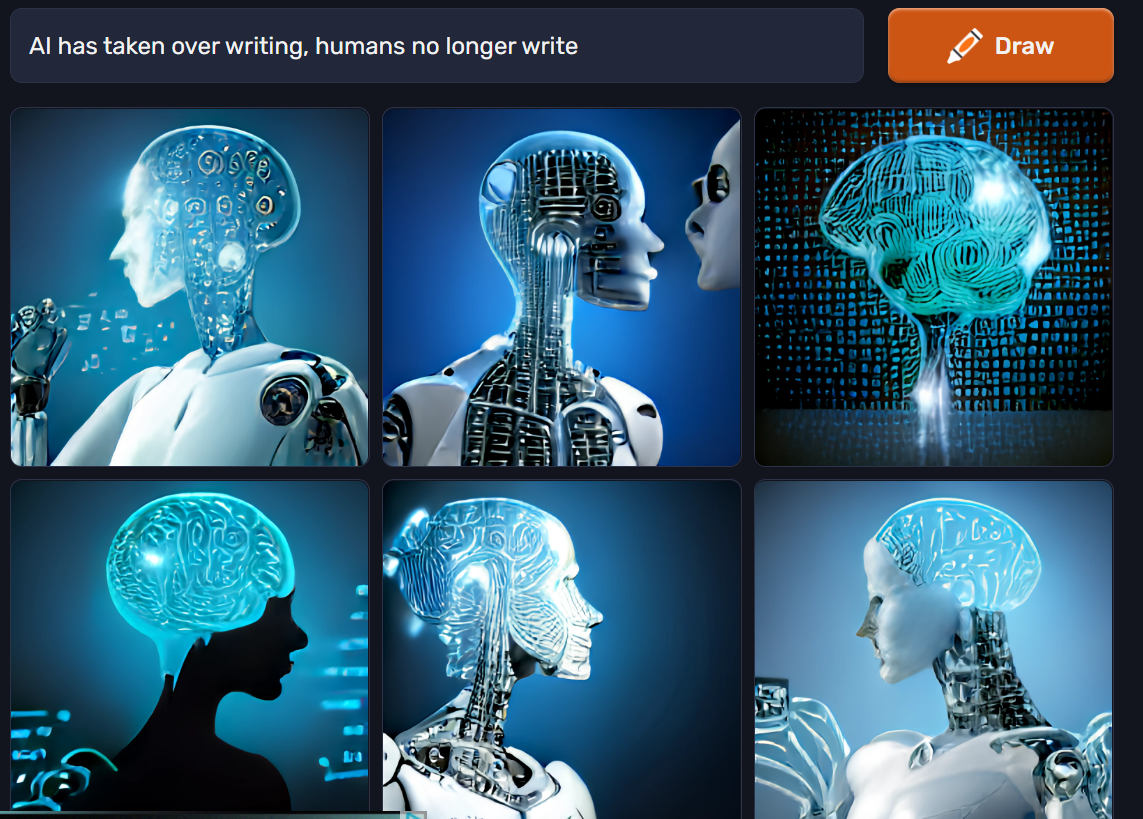
And speaking of art and AI, artists’ works are being fed into AI and then, basically, stolen.
What about writing? Well, ChatGPT was unleashed on the world on Nov. 30, 2022 and the writing it produces is actually human quality. It’s incredibly impressive, which is a scary prospect for writers.
AI defines AI
“Artificial intelligence (AI) is a branch of computer science that aims to create intelligent machines that can think and act like humans. It is an interdisciplinary field of science that combines computer science, mathematics, psychology, linguistics, engineering, and other sciences to create intelligent systems that can analyze large amounts of data, recognize patterns and relationships, and make decisions based on the information they have. AI has the potential to revolutionize many industries and is already being used to help solve complex problems in fields like healthcare, finance, and transportation.”
This was the answer given by AI itself, using ChatGPT.
What is AI writing?
ChatGPT, created by OpenAI, is currently in the spotlight.
Ask it to write a blog, it will. Ask it for an outline, great, there you go. It can answer questions, it can create tweet threads; it’s what many wish Google was in terms of answering questions.
Ask ChatGPT to write an episode of the Simpsons, and it can (albeit, not a fleshed-out, funny script).
Still, we’re talking human writing. It’s Detailed. Smart. Sophisticated and unidentifiable compared to a human.
For example, I asked “what is chatgpt” and this is what it spit out in about 15 seconds:
“’What is chatgpt’
ChatGPT is a conversational artificial intelligence chatbot developed by OpenAI. It uses natural language processing and deep learning algorithms to understand and respond to user queries in natural language. ChatGPT is designed to provide personalized conversations with users, engaging them in a natural and human-like way.”
Read that again, “...human-like way.”
The point isn’t just to answer questions, but for a computer to take an insane amount of data, compute it, and spit out a human description back to humans.
That’s wild.
ChatGPT writing code
ChatGPT is not just writing, but used for writing code, too.
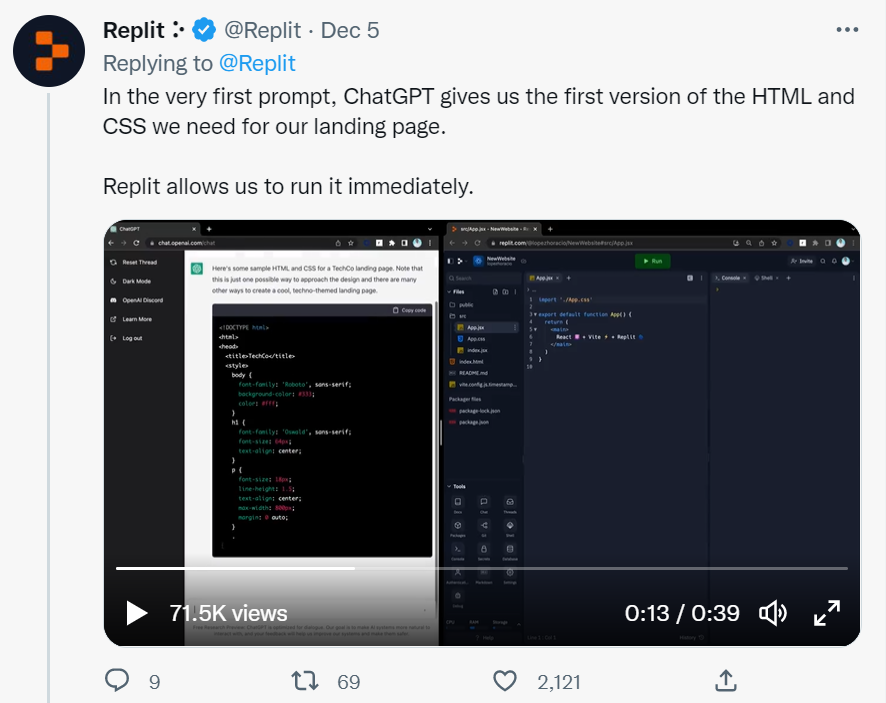
Here’s Replit using ChatGPT to write code and build a website in real time.
Which is really cool, sure. It’s fast, efficient and anyone can use it.
But what does that mean for website developers and their jobs?
Here, I asked ChatGPT to write the code for a website with a blog, gallery and shop with Shopify using React.
Here’s what it gave me:
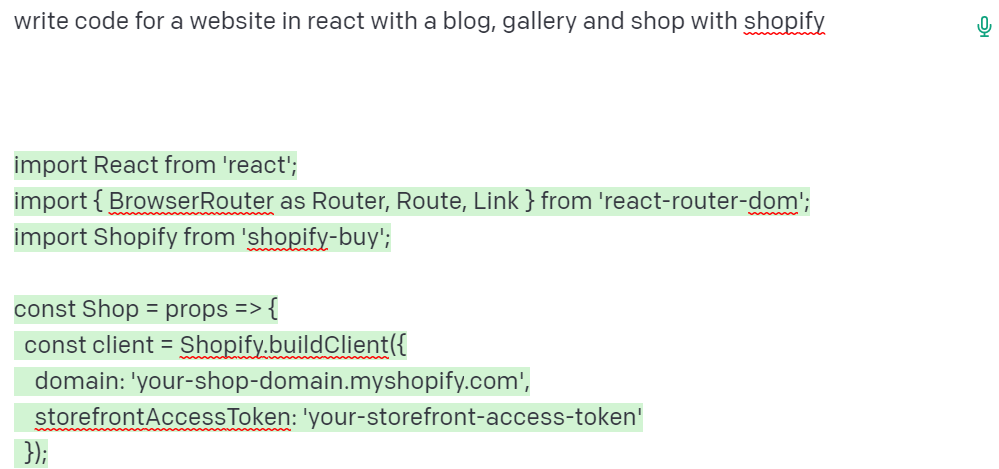


That seems straightforward enough, and our CTO confirmed the "component looks right."
Blog on AI from ChatGPT and what it means for writers
And for writers, the future is similarly ominous. AI is already fantastic at writing and will only continue to get better.
Here’s a blog on AI from ChatGPT:
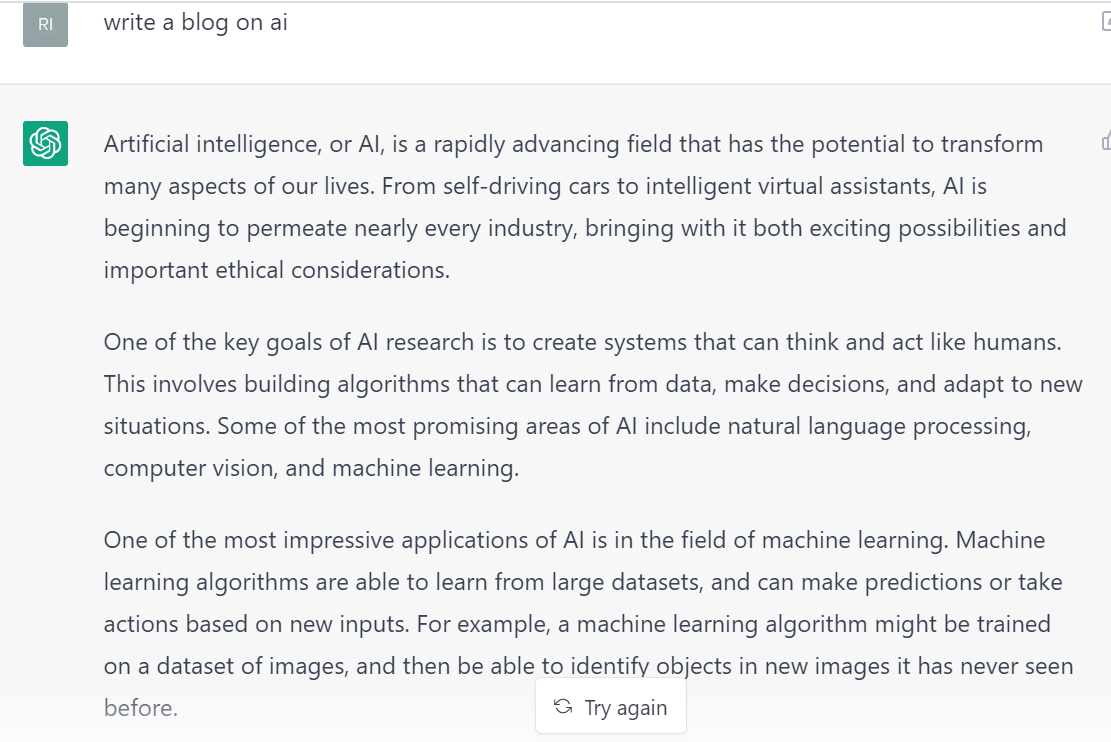
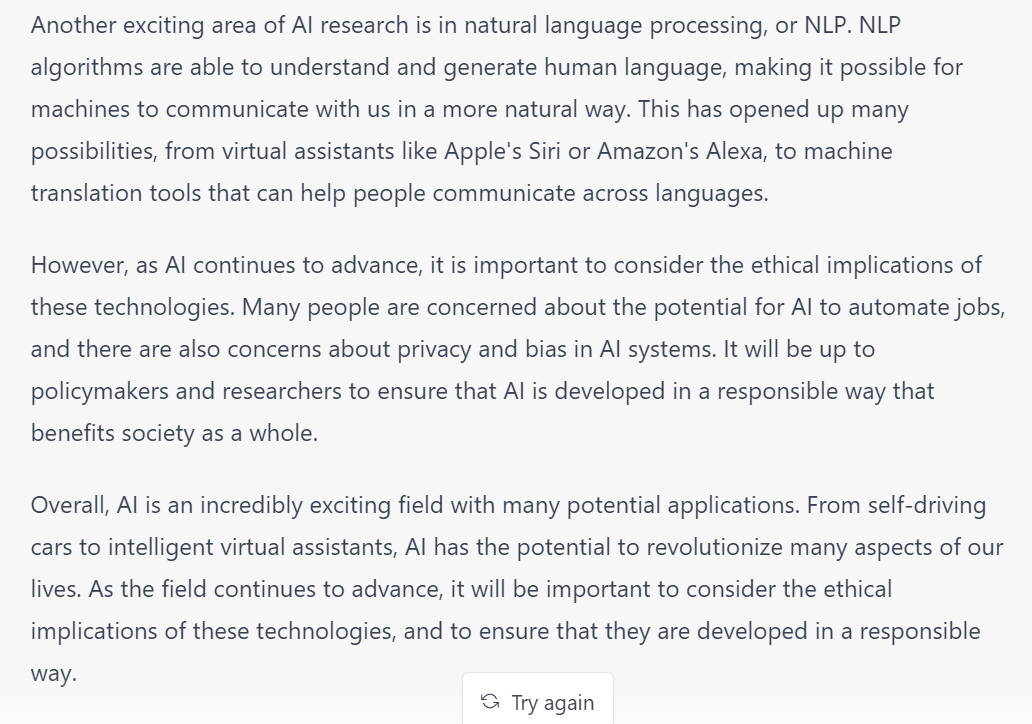
Wonderfully, ChatGPT even acknowledges the ethical implications of using AI here.
“Many people are concerned about the potential for AI to automate jobs, and there are also concerns about privacy and bias in AI systems,” ChatGPT itself wrote.
So that leads to this key question, which ChatGPT just explained itself: If ChatGPT can write this well, what does it mean for writers? Content creators? Bloggers? Will they all be replaced?
For developers, it’s a similar scariness: Will developers be replaced by AI?
And will writers be replaced by robots too?
How human writers can fight back
We’ve already seen AI disrupting the world of art.
Artists – both living and deceased – are having their artworks put into AI and then those artists are basically being ripped off. AI creates a style of art based on that specific artist’s work.
Sounds a lot like plagiarism.
And in the same way that workers on the factory floors are being replaced by robots, it doesn’t seem like a far leap to say humans will be replaced as writers in the near future, too.
Why pay a human writer to create content for you when you can get it generated by AI for free?
Companies can save thousands of dollars by “employing” AI to generate their written content. And that’s a hugely scary thing for writers.
So, what can writers do to fight back?
Simply, be yourself.
Your voice is unique to you.
Unless, for some reason, a person inputs YOUR writing into AI and copied it like with those painters/digital artists, your writing will always be yours.
Continue to write, read and learn. Improve your craft by taking notes. Set goals. Have fun.
Appeal to emotion
And remember ethos, pathos and logos. Of course, AI will know what those terms mean, but will it learn to communicate with them?
Ethos means an appeal to character, or establishing credibility. Pathos is the appeal to logic, or making a logical argument. Like, “AI can use machine learning to process information faster than humans. Computers process information more quickly than people because they have faster processors and a larger capacity for memory.”
And then there is logos. Logos is an appeal to emotion, which is what most debates are based on. In fact, this article you’re reading uses a lot of logos “...it is scary to think AI could replace human writers...” while also using logic, “AI is being used to make calculations in autonomous vehicles...”
While most arguments will use more of one appeal than another, almost all use a combination of the three to form the best argument possible.
But when it comes to an emotional appeal, it is something humans can do that AI can’t...yet.
Then the next question becomes: Do we want AI to understand our emotions and to then base arguments off of those feelings in order to convince us?
AI can’t create unique art every day, can it?
Ultimately, writing is inherently creative. Humans cannot simply create unique, new pieces of art every, single day.
Neither can AI. At least, there are some limits at this point.
Sure, you can put in the prompt “Write a blog about bunnies” and it will. But it will be only 233 words. And ask it to do it again, the same story comes out. Or at least, an incredibly similar one.
A human can and will adjust, take feedback and work towards the right goal. With rest, of course.
The positive side of AI chatbots
For tiny teams, or even one-person companies, this ChatGPT could be wonderful for creating copy of a website, helping with marketing copy and possibly even writing small blogs.
It’s incredibly fast, so the timesaving would be crucial for a small team just needing something to get off the ground.
Brainstorming
Another huge positive is the fact that writers can enter any kind of prompt which could help them brainstorm. Sometimes the hardest thing to do is write the first words to a blog, and then things start flowing like water from a wide-open faucet.
You can ask for a “blog” on a topic – which could be really helpful for topics you don’t know well – or even an “outline” of something convoluted. A writer could then copy and paste that outline into the start of a blog, book or anything else creative.
AI-assisted helpbots
Imagine being lost in an airport or foreign city where you don’t speak the language.
An AI chatbot could help you find your way – understanding your native tongue – decipher signs to help you know where to go and answer any other questions which may come up on your journey.
Similarly, one could hypothetically ask a chatbot how to change the oil in his car, or even do much more complicated repairs to it in the future, and that chatbot could walk you through the process.
AI and Machine Learning solving complicated problems
Another huge positive of AI is the ability to solve incredibly complicated, time-consuming problems for humans.
The way it solves those problems is with machine learning.
From Jay Selig at expert.ai:
“Machine learning is an application of AI that enables systems to learn and improve from experience without being explicitly programmed. Machine learning focuses on developing computer programs that can access data and use it to learn for themselves.”
So, think of AI as the intelligence, the smarts of a computer system. The data.
But machine learning is how it uses that data to do predict future events or sound like a human. And simply, learn from the data.
AI-ML use case: Habistack Weather Forecasting API
Fathym’s Habistack, also uses a combination of AI-ML for weather forecasting, specifically related to road conditions.
Habistack combines the world's best weather forecasts with statistics-based, machine-learning techniques to tackle the largest datasets, including road weather. Habistack offers developers comprehensive weather forecasting capabilities over freely chosen locations and routes across the globe. The API delivers a unique suite of highly specialized forecast variables derived through statistically based machine learning models.

That data is all ingested into Microsoft Azure and into the AI, and then the machine learning uses all that data to create forecasts (predictions) based on that data.
What will the ethics of creative AI be?
Plagiarism is bad. Period.
That’s the first thing we’re all taught when we learn to write in school.
You can’t just copy someone else’s words or thoughts. That’s wrong.
So, will we hold AI to the same standard?
And if we don’t what will artists be able to do about it? How will a writer prove they’ve been plagiarized? Imagine the AI has hundreds or thousands of writers’ words plugged into it. It would be extremely difficult to prove those were your words.
And how could a writer find time or money to fight against those plagiarisms?
Will we one day have human vs. AI writers in bookstores?
Will humans want to become writers if AI becomes better at writing stories than we are?
And would people be more willing to read AI-written material, knowing it has the vast knowledge of everything inside of it, versus a human who has relatively little knowledge in comparison?
Of course, this is a new technology. There are more questions than answers.
But one can imagine a future – a not too distant one, at that – in which much of the writing we consume is actually cooked up by AI chatbots instead of humans.
And if it comes to pass, that will be a sad day in human history.
Narrative has been central to building and understanding our world as humans for hundreds of thousands of years. That’s why social media is so popular and why it’s our modern version of sitting around the campfire in the cave.
We must continue to write narratives, even if (when?) AI is better than us. Which seems imminent.